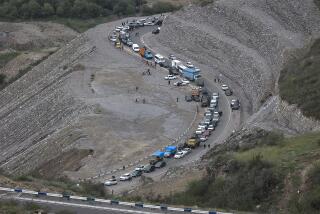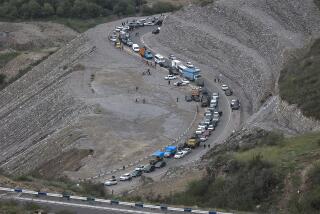Iran nuclear deal appears imminent
GENEVA — A deal to limit Iran’s nuclear program appeared close to completion Friday as negotiators from six world powers and Tehran smoothed remaining conflicts and top diplomats began arriving to join the talks.
After a rocky day Thursday, negotiators appeared for now to have overcome their differences on Iran’s entitlement to enrich uranium and on how to curb progress on a partially built nuclear research reactor that Western powers view as a particular threat.
U.S. Secretary of State John F. Kerry left late Friday for Geneva to help “narrow the differences and move closer to an agreement,” the State Department said. Sergei Lavrov, Russia’s foreign minister, arrived from Moscow early Friday evening, making him the first of the six nations’ ministers to show up for a possible signing ceremony that would end a decade of usually stalemated negotiations.
“Negotiations are moving on a positive track,” Iranian Deputy Foreign Minister Takht Ravanchi said.
A deal would be a first-stage agreement that would give Iran temporary relief from the crushing Western sanctions on its economy in exchange for temporary limits on its nuclear program. Many nations fear that Iran, despite its insistence that its program is for peaceful purposes only, is seeking weapons capability with its huge nuclear infrastructure.
This deal would open the way for tough bargaining on a final, comprehensive agreement that would take six months or longer to be reached.
A preliminary agreement would be a major step and could reduce the threat of another war in the Middle East. But as soon as it is signed it is likely to come under attack by Republican and Democratic lawmakers and U.S. allies such as Israel and Saudi Arabia, who fear that it will be too lenient.
This week’s round of meetings was the third in five weeks. The last session, Nov. 8-10, broke down under circumstances that are still disputed by U.S., French and Iranian officials.
Iranian negotiators threatened to halt this week’s negotiations over the enrichment issue. They have been seeking language that would make it possible for the Islamic Republic to receive an international endorsement to enrich uranium once there is completion of a final deal ensuring that its program will remain peaceful.
Iranian officials were angry that an earlier draft agreement was revised Nov. 9, after French objections, in a way that they believed violated Iran’s rights, diplomats said. The new agreement won’t explicitly acknowledge Tehran’s right to enrich — the U.S. and its allies deny that it has such a right — but its broad language could open the way for Iran to produce low-enriched uranium suitable for reactors used for civilian purposes.
The dispute over the Arak heavy-water reactor also appeared headed for a resolution. Western powers have pushed to limit over the next six months construction of the reactor, which they fear could provide Iran a separate route to a nuclear bomb.
Iranian officials, who don’t want to be viewed at home as surrendering a high-tech prize, argued that they should be able to continue some work, since the plant will not be completed for six months or longer.
Despite the progress on the obstacles, diplomats emphasized that the deal was not complete and that other barriers could still arise.
Iranian Foreign Minister Mohammad Javad Zarif met repeatedly with European Union foreign policy chief Catherine Ashton to negotiate wording. Then the Iranians and the six powers — the United States, Russia, China, France, Britain and Germany — called their capitals to get approval on the terms.
terms.
More to Read
Start your day right
Sign up for Essential California for news, features and recommendations from the L.A. Times and beyond in your inbox six days a week.
You may occasionally receive promotional content from the Los Angeles Times.







